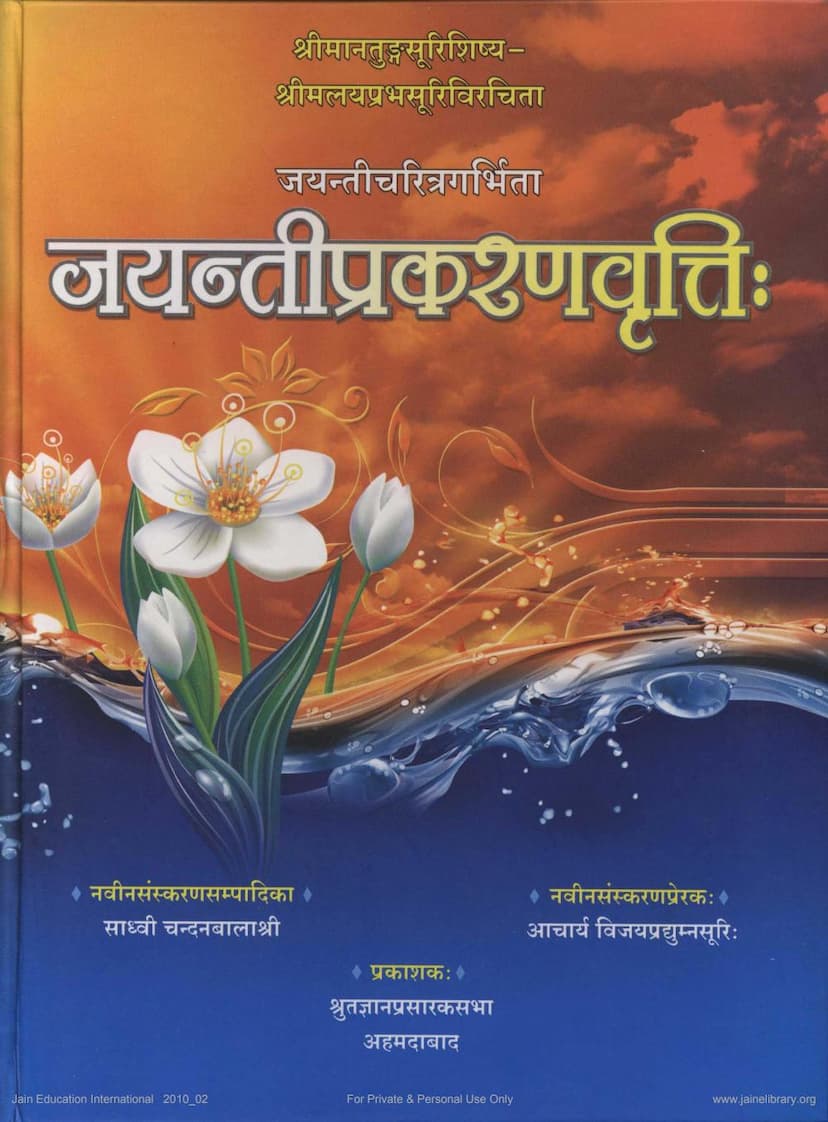Jayantiprakaranvrutti
Added to library: September 2, 2025

Summary
Here's a comprehensive summary of the Jain text "Jayantiprakaranvrutti" by Malayprabhsuri, based on the provided pages:
Title: Jayantiprakaranvrutti (with Jayanticharitra embedded)
Author: Malayprabhsuri (disciple of Param Pujya Acharya Varya Shri Mantunga Suri Maharaj)
Publisher: Shrutgyan Prasarak Sabha, Ahmedabad
Compilation: Sadhvi Chandanbalashreeji (disciple of Param Pujya Pravartini Shri Rohitashriji Maharaj)
Inspiration for New Edition: Acharya Vijaypradyumn Suri Maharaj
Origin of the Text: The "Jayantiprakaran" (or "Jayantikaran") itself is an extract of 29 Prakrit verses compiled by Param Pujya Acharya Bhagwant Shri Mantunga Suri-Ishwar Maharaj. These verses were taken from the second 'Udesha' (section) of the twelfth 'Shatak' (chapter) of the Panchamanga Bhagavati Sutra, an important Jain scripture. The purpose of this compilation, as indicated in the original Prakrit verses, was for the remembrance of oneself and others, likely in a spiritual context.
The "Vrutti" (Commentary): The "Jayantiprakaranvrutti" is a detailed commentary written on the original "Jayantiprakaran" by Param Pujya Acharya Bhagwant Shri Malayprabha Suri-Ishwar Maharaj, the esteemed disciple of Shri Mantunga Suri. This commentary is substantial, estimated to be around 6600 verses in length, and is rich with various narratives and instructive stories.
Key Content and Themes:
- Jayanti's Story: The text is deeply connected to the story of Mahasati Jayanti. She is identified as the daughter of King Sahasranika of Vatsadesha, the sister of King Shatnika, and the aunt of King Udayana. Jayanti was a devout Jain practitioner, renowned for providing lodging to Jain monks, earning her the title of "Prathama Shayyatari" (first provider of lodging).
- Jayanti's Questions to Lord Mahavir: The narrative highlights a significant event where Lord Mahavir visited the city of Kaushambi. During Lord Mahavir's discourse, Mahasati Jayanti posed several profound questions about Jain philosophy, particularly concerning the soul (Jiva) and karmas (action and consequence). The answers provided by Lord Mahavir form the basis of the original "Jayantiprakaran" within the Bhagavati Sutra.
- Extensive Narratives (Kathas): The commentary ("Vrutti") by Malayprabhsuri is characterized by the inclusion of approximately 56 illustrative stories, which makes it a valuable compendium of narratives. These stories cover a wide range of ethical and spiritual themes relevant to Jain teachings, including:
- Abhaydan (Fearlessness/Protection): Illustrated by the story of Meghkumar.
- Karuṇādāna (Compassionate Giving): Exemplified by the story of Samprati.
- Shilapalan (Adherence to Virtue/Chastity): Narrated through the story of Sudarshan Sheth and Manorama Sati.
- Maan (Ego/Pride): Discussed in the context of Bahubali.
- Various Philosophical Concepts: The text delves into topics like the nature of the soul, the causes of karma, the distinction between the soul and non-soul, the merits of different spiritual practices, and the consequences of various ethical transgressions.
- Eighteen Papashthanaks (Sinful Activities): The commentary extensively explains the eighteenfold categories of sinful actions, providing specific stories and examples for each, such as:
- Pranavadh Virati (Abstinence from violence) - Story of Bandhumati.
- Asatya (Untruthfulness) - Story of Vasuraj.
- Adattadan (Stealing) - Story of Dulalitgothiya.
- Purdargaman (Adultery) - Story of Vanikstri.
- Parigraha (Attachment/Possession) - Story of Lobhnandi.
- Krodha (Anger) - Story of Prashantachandra Rishi.
- Maan (Pride) - Story of Bahubali Muni.
- Maya (Deceit) - Stories of Pandurarya, Dhanashri, Anangsundari.
- Lobha (Greed) - Story of Kapil.
- Raga (Attachment) - Story of Shrikant.
- Dvesha (Hatred) - Story of Nandanavik.
- Kalaha (Conflict) - Story of Somapurohita.
- Abhkyakhana (Slander) - Story of Angarshik.
- Arati (Displeasure) - Story of Kshullak Kumar.
- Rati (Pleasure) - Story of Brahmadvatta Chakravarthi.
- Pashunya (Cruelty towards animals) - Story of Subandhu Mantri.
- Paraparivada (Slander of others) - Story of Subhadra Sati.
- Mithyatva Shalya (Wrong Faith) - Story of Kandrika.
- Bhavyanityapranali (The Bound vs. Unbound Soul): The text addresses the concept of souls destined for liberation (Bhavya) and those not destined for it (Abhavya). It clarifies that being Bhavya is an inherent characteristic, not a result of karma. It also discusses the intricate analogy of the sky and atoms to explain why not all Bhavyas attain liberation simultaneously.
- Ethical Dilemmas and Exemplary Lives: The stories illustrate the Jain ethical framework through relatable characters facing moral choices. They highlight the consequences of actions, the importance of virtues like non-violence, truthfulness, non-stealing, chastity, detachment, and the power of spiritual practices like penance and meditation.
- Narrative Style: Malayprabhsuri's commentary is noted for its "rasmay" (flavorful/eloquent) and "madhur" (sweet) style. The stories are woven together with a rich vocabulary and often employ "anyanupras" (alliteration), adding to the aesthetic appeal of the text.
Historical Context:
- The original "Jayantiprakaran" was composed by Shri Mantunga Suri in 1260 Vikram Samvat.
- Shri Malayprabha Suri, his disciple, composed the commentary in 1260 Vikram Samvat.
- The first printed edition of this commentary was published in Vikram Samvat 2006 (1949 AD) as the 12th publication of the Manivijayganivar Granthamala. The editor and researcher of that edition was Param Pujya Acharya Bhagwant Shri Vijay Kumud Suri Maharaj, who used a palm-leaf manuscript from Khambat.
- The current edition is a new reproduction based on a prior edition obtained from Koba Shri Kailas Sagar Gyanbhandar.
Significance of the New Edition: The new edition, published in 2010 by Shrutgyan Prasarak Sabha, Ahmedabad, aims to bring this valuable text to a wider audience. It includes:
- An expanded index (Anukramanika) and various appendices (Parishishta).
- Corrections and improvements to the previous edition, particularly addressing inconsistencies in vowel length and other printing errors.
- The inspiration for this new edition came from Acharya Vijaypradyumna Suri Maharaj, and the editing was undertaken by Sadhvi Chandanbalashreeji.
Overall Purpose: The "Jayantiprakaranvrutti" serves as an extensive commentary on a foundational Jain text, offering profound spiritual insights and ethical guidance through a rich tapestry of narratives. It aims to educate and inspire readers to pursue the path of liberation by understanding the principles of Jainism, particularly through the lives and teachings of Mahasati Jayanti and Lord Mahavir. The compilation of these stories and teachings is intended to foster spiritual reflection and practice, leading to the attainment of ultimate bliss.